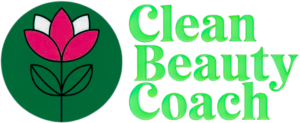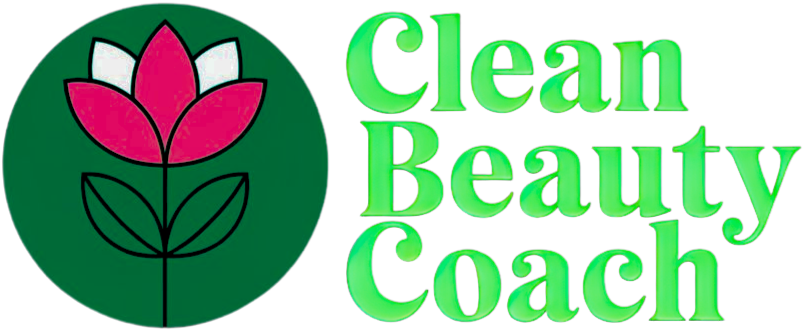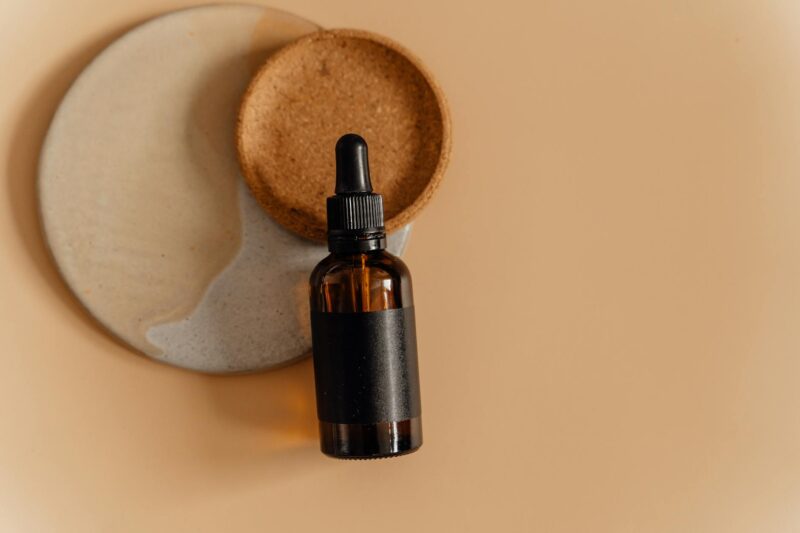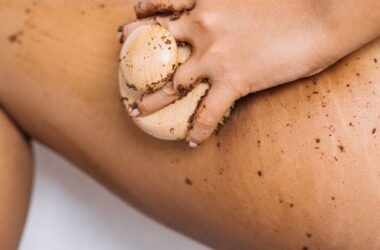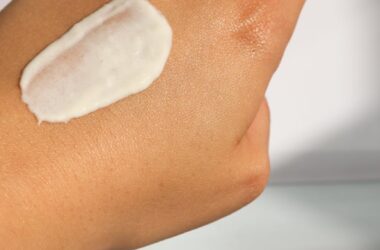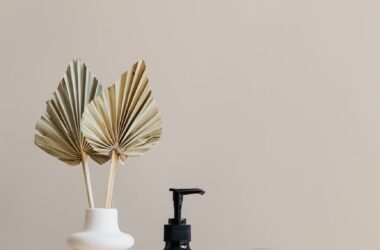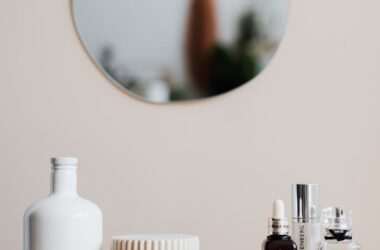You’ve probably heard of retinol, the active ingredient in anti-aging skin care products that targets fine lines and the appearance of wrinkles.
But, you may be wondering… Is bakuchiol a safe alternative?
Is Bakuchiol Safe?
Bakuchiol is safe to use. It’s a plant-based ingredient, so you don’t have to worry about harsh chemicals or irritating your skin.
Because it’s a plant-based retinol alternative, bakuchiol is gentler on the skin than retinol.
It doesn’t cause redness, irritation, itching, or flaking that are often associated with retinol use.
Also, because bakuchiol is non-irritating and gentle on the skin, you can use it daily.
This makes it a great anti-aging and anti-acne ingredient for all skin types — including sensitive skin!
How Does Bakuchiol Work?
Bakuchiol is a plant extract that mimics the effects of retinol without the side effects.
It’s extracted from the seeds and leaves of Indian babchi herbs, which have been used for centuries in Ayurvedic medicine.
A natural anti-inflammatory, it has also been used to treat psoriasis, eczema, and other skin conditions.
Bakuchiol works by accelerating skin cell turnover to reveal the glowing skin below. It also works on a cellular level to improve the structure and firmness of the skin.
Combined with other anti-aging ingredients like vitamin C, hyaluronic acid, niacinamide, ceramides, and peptides (like copper peptides), bakuchiol works at every level to improve skin texture, tone, and firmness while fading dark spots and discoloration caused by aging.
It’s also a powerful antioxidant that can help rid your skin of free radicals (which are caused by everything from pollution to sunlight).
Free radicals are all around us and can speed up the aging process. Bakuchiol helps counteract them.
How to Safely Use Bakuchiol
Ready to start using bakuchiol? Follow these tips to safely use bakuchiol:
1. Apply a patch test first
If you’ve never used bakuchiol before, it’s a good idea to perform a patch test first.
This helps you to identify any allergies or sensitivities you might have to the product.
To perform a patch test, apply a small amount of bakuchiol to the inside of your elbow or forearm.
Wait about 24 hours to see if your skin reacts negatively to the product.
If you notice any irritation or redness, stop using the product immediately and consult a dermatologist if your symptoms persist.
2. Use it at night
Like most other anti-aging products, bakuchiol is best used at night.
This is because the skin regenerates better during sleep than at any other time of the day.
In addition, sunlight may deactivate some of its beneficial effects, so it’s best to apply it before bedtime.
3. Apply it after cleansing before moisturizing
It’s a good idea to introduce bakuchiol into your skincare routine by applying it directly after cleansing and toning, but before moisturizing.
4. Combine it with sunscreen
Bakuchiol does not offer any sun protection, so make sure you wear sunscreen or another product that has SPF in it every single day to prevent skin cancer and premature signs of aging from the sun.
5. Don’t overuse it
As with most powerful skincare ingredients, you don’t want to overuse bakuchiol as this can cause irritation and sensitization.
For example, using a higher concentration than recommended or using it too frequently than necessary can irritate the skin and disrupt its normal function.
If you’re not sure about which concentration or frequency of application is best for your skin type, consult with your dermatologist first.
6. Start with a low concentration of bakuchiol
If your bakuchiol product contains 0.5% or 1% of the ingredient, start with these options before working up to stronger concentrations.
This will help prevent skin irritation and allow you to assess how your skin reacts to the ingredient over time.
Will Using a Bakuchiol Sunscreen Clog Your Pores?
In theory, using a bakuchiol sunscreen shouldn’t clog your pores. But that doesn’t mean it won’t.
First, why might it not clog your pores? Well, bakuchiol is a retinol alternative that has been proven to have the same benefits as retinol without all of the irritating side effects.
Retinol is a vitamin A derivative and is highly comedogenic, which means it can clog your pores and cause acne.
So why might it still clog your pores?
Well, every single person’s skin is different. What works for one person may not work for another, especially when it comes to certain ingredients.
So while bakuchiol might not be comedogenic on most people (and there are tons of studies to prove so), it might clog your pores if you’re using a product with other pore-clogging ingredients in addition to bakuchiol.
The only way to know for sure is to try it out and see how your skin reacts. If you’re worried about it, start off by testing it on a small area of skin first.
Do You Need a Sunscreen That Has Bakuchiol?
Nope! You don’t need a sunscreen that has bakuchiol. But you do need a sunscreen that creates a physical barrier between you and the sun — like mineral-based ones that contain titanium dioxide and zinc oxide, according to board-certified dermatologist Shari Marchbein, MD.
Bakuchiol is actually an antioxidant, not a sunscreen ingredient (at least for now).
But it does protect your skin from free radicals and environmental aggressors like pollution and smog, which can cause skin damage. (Free radicals are chemically unstable molecules that can damage healthy cells.)
When Should You Reapply Your Bakuchiol Sunscreen?
Every two hours, like you would with any other sunscreen.
But if you’re sweating a lot or spending a lot of time in the water, be sure to reapply it more often than that.
How Often Should You Use Bakuchiol?
Apply bakuchiol to your skin once or twice per week at first. You can gradually increase how often you use it if your skin doesn’t react negatively.
For example, if your skin can tolerate twice-weekly applications without irritation, try adding another application every 1–2 weeks until you’re applying it 3–4 times per week (or daily).
Is Bakuchiol Good for Acne?
Yes, bakuchiol is good for acne. Bakuchiol and retinol are both proven to be effective in treating acne, but there is a debate about which one is more effective.
In a study by the British Journal of Dermatology, 70 percent of patients who used bakuchiol experienced a significant reduction in their breakouts while only 40 percent of those who used retinol showed improvement.
This makes bakuchiol an excellent option for people with acne-prone skin.
Is Bakuchiol Vegan-friendly?
Bakuchiol is a plant-based ingredient that is cruelty-free and vegan-friendly.
It is extracted from the seeds and leaves of the Psoralea corylifolia plant, which has been used for centuries in Ayurvedic medicine.
In western skincare, bakuchiol has been shown to be as effective as retinol without any of the unwanted side effects.
Can You Use Bakuchiol if You’re Pregnant or Breastfeeding?
According to the National Institutes of Health, no studies have been done on bakuchiol in pregnant or breastfeeding women.
Because of this, it’s best to avoid using any products that contain bakuchiol if you’re pregnant.
Once you’re nursing, ask your doctor about using products that contain bakuchiol.
Benefits of Bakuchiol on Your Skin
This section lists 10 science-backed benefits of bakuchiol on the skin.
1. A more natural alternative to Retinol
Bakuchiol is a natural alternative to retinol. It won’t cause you to break out, it won’t make your skin flake and peel off, and it won’t make your skin sensitive to the sun.
2. Works as an antioxidant
Bakuchiol is a natural antioxidant that can protect your skin from free radical damage caused by pollution and UV rays.
3. Restores collagen production
Studies have shown that Bakuchiol can stimulate collagen production in the skin, which helps with wrinkles, fine lines, and sagging.
4. Anti-inflammatory properties
Bakuchiol has potent anti-inflammatory properties that can reduce redness and irritation in the skin, making it a good choice for those who suffer from acne or rosacea.
5. Is suitable for all skin types and ages
Because Bakuchiol does not have the irritating side effects of Retinol, it is suitable for all skin types and ages, even sensitive skin!
6. Makes your skin glow
Bakuchiol can help to brighten up dull skin, leaving you with a more radiant complexion!
7. Prevents acne and blackheads.
Because Bakuchiol reduces the production of sebum and inflammation, it prevents clogged pores and acne breakouts.
8. Nourishes the skin.
Bakuchiol is rich in antioxidants that protect your skin from free radicals, which can damage your skin cells and damage collagen.
It also helps reduce oxidative stress in the skin, which is one of the main causes of aging.
Final Thoughts
Bakuchiol is an interesting new ingredient and it is quickly making the rounds in the beauty community, but does it live up to all of the hype?
The good news is that it is basically safe for skin use and there are even some great benefits of using this ingredient on your face and body.
